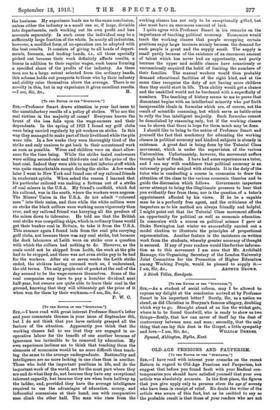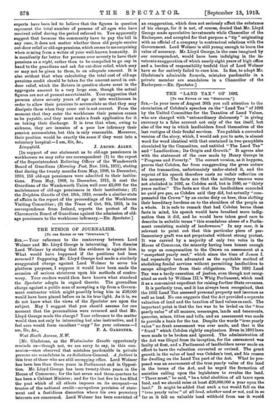OLD-AGE PENSIONS AND PAUPERISM
[TO THE EDITOR OF THE "SPECTATOR."]
have read with interest your remarks on the recent Return in regard to Old-Age Pensions and Pauperism, but suggest that before you found fault with your Radical con- temporaries you should have satisfied yourself that your own article was absolutely accurate. In the first place, the figures that you give apply only to persons above the age of seventy who have been in receipt of relief. No doubt the writer of the article was aware of this fact, but as he omitted to Bay so the probable result is that those of your readers who are not experts have been led to believe that the figures in question represent the total number of persons of all ages who bare received relief during the period referred to. You apparently suggest that because the community have to pay the bill in any case, it does not matter whether these old people receive out-door relief or old-age pensions, which seems to me surprising when ccming from a writer of your well-known humanity. It is manifestly far better for persons over seventy to have their pensions as a right, rather than to be compelled to go cap in hand to the guardians and ask for out-dOor relief, which may or may not be given to them, to an adequate amount. It is also evident that when calculating the total cost of old-age pensions credit should be taken for the amount saved in out- door relief, which the Return in question shows must in the aggregate amount to a very large sum, though the actual figures are not at present ascertainable. Your suggestion that persons above seventy years of age go into workhouses in order to allow their pensions to accumulate so that they may dissipate them when they come out is not correct. From the moment that they enter the workhouse their pension ceases to be payable, and they must make a fresh application for it on taking their discharge. It is true that when, owing to sickness, they are inmates of a poor law infirmary their pension accumulates, but this is only reasonable. Moreover, their position would be exactly the same if they went into a voluntary hospital.—I am, Sir, &c., [In support of our statement as to old-age pensioners in workhouses we may refer our correspondent (1) to the report of the Superintendent Relieving Officer of the Wandsworth Board of Guardians (Morning Post, Nov. 15th, 1911), stating that during the twenty months from May, 1909, to December, 1910, 155 old-age pensioners were admitted to their institu- tions. From May, 1909, to December, 1911, it cost the Guardians of the Wandsworth Union well over 25,000 for the maintenance of old-age pensioners in their institutions ; (2) the Brighton Gazette of Oct. 19th, 1910, records a similar state of affairs in the report of the proceedings of the Workhouse Visiting Committee ; (3) the Times of Oct. 8th, 1910, in its correspondence from Ireland, reports the protest of the Claremorris Board of Guardians against the admission of old- age pensioners to the workhouse infirmary.—En. Spectator.]











































 Previous page
Previous page